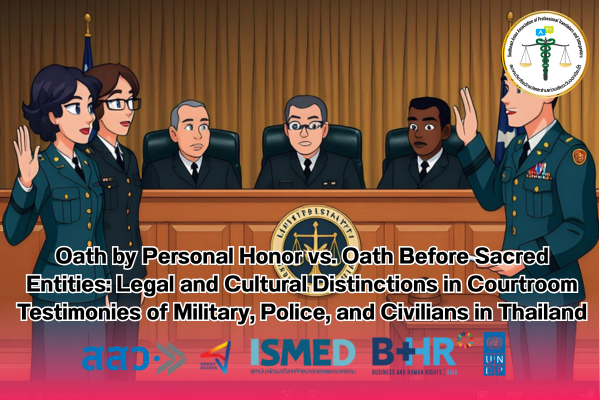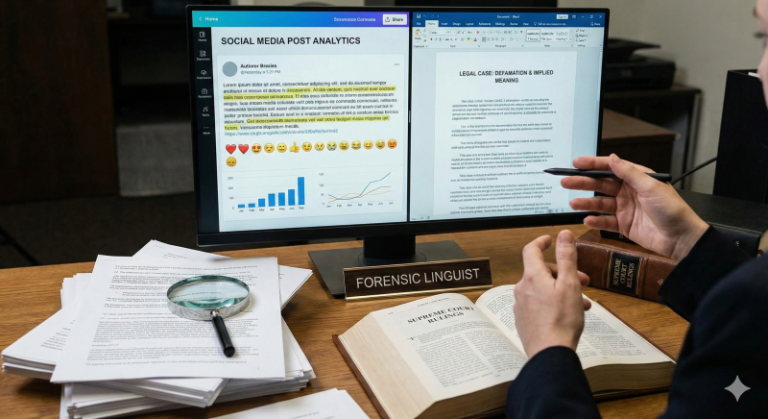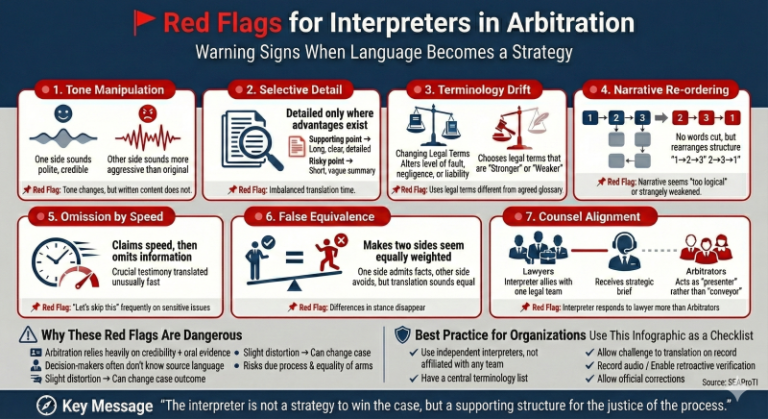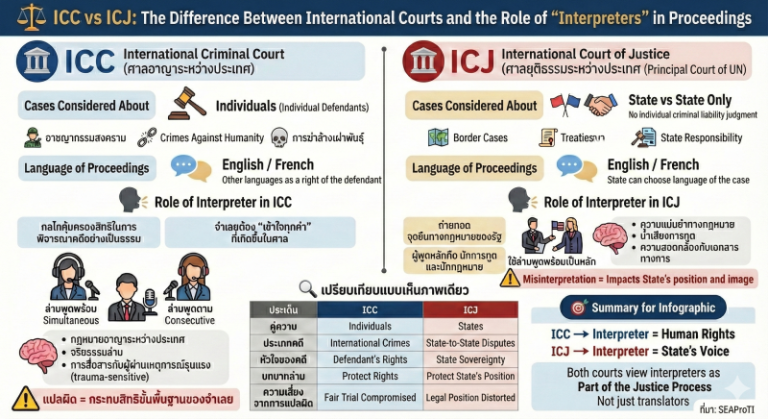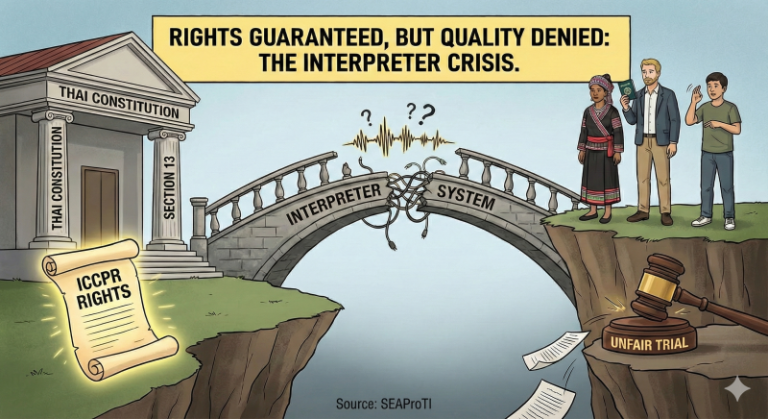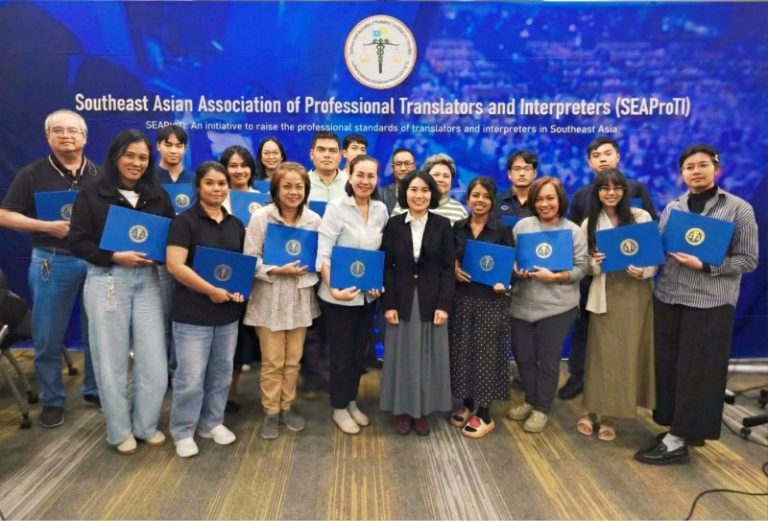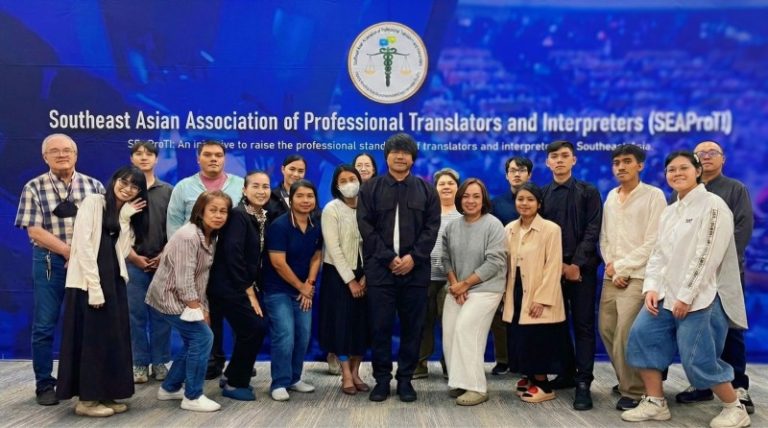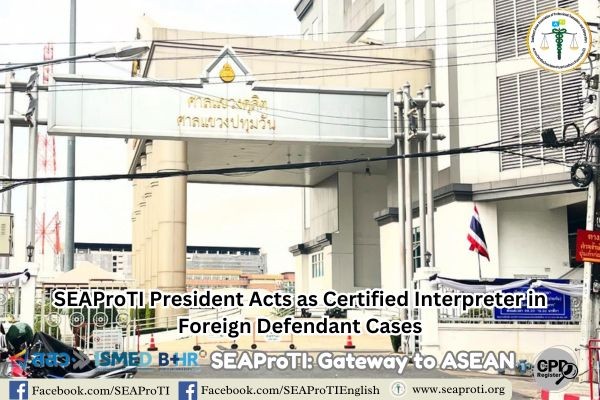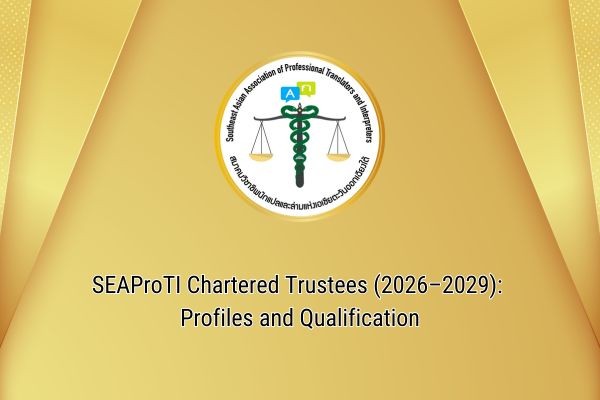Oath by Personal Honor vs. Oath Before Sacred Entities:
Legal and Cultural Distinctions in Courtroom Testimonies of Military, Police, and Civilians in Thailand
Authored by Wanitcha Sumanat, President of the Southeast Asian Association of Professional Translators and Interpreters (SEAProTI).
25 July 2025, Bangkok – This article explores the legal and cultural distinctions between the use of an “oath by personal honor,” often employed by members of the police and military, and the “oath before sacred entities,” typically used by civilians when testifying in Thai courts. The analysis draws on legal frameworks, professional ethics, and organizational culture, as well as the broader context of religious freedom and belief. Understanding these different forms of testimony reveals how Thai society interprets truth and legitimacy within the justice system.
1. Introduction
In Thailand’s judicial process, witnesses are legally required to affirm that they will speak the truth when giving testimony, whether in civil or criminal proceedings. This affirmation can take the form of either a “sworn oath” or a “declaration” (Supit Praneedpolgrang, 2016). Interestingly, members of the police and military often choose to declare by their “honor,” whereas civilians tend to swear before a “sacred entity.” This article investigates the underlying rationales for this divergence.
2. Legal Framework: Sworn Oath vs. Declaration
According to Section 117 of the Civil Procedure Code and Section 180 of the Criminal Procedure Code of Thailand, a witness must either take an oath or make a declaration to tell the truth. The court permits this to be done under the witness’s beliefs or moral principles (Office of the Judiciary, 2022).
This flexibility reflects freedom of religion and belief, which is protected under Section 31 of the Constitution of the Kingdom of Thailand (2017). It allows individuals to affirm truth based on personal conscience, whether through religious rituals or secular declarations.
3. Professional Ethics in the Military and Police
Police and military officers in Thailand are required to pledge loyalty to the Nation, Religion, and the Monarchy upon entering service. They are also bound by strict codes of military and police ethics, which place a high value on honor, truthfulness, and discipline. In this context, “honor” (เกียรติ) is not a mere personal trait but a formal ethical pillar.
Therefore, an “oath by honor” is not merely symbolic—it is a solemn affirmation grounded in a code of conduct that treats dishonesty as a violation of institutional dignity (Charuwan Thongkham, 2021).
4. Organizational Culture and the Meaning of Honor
Within the organizational culture of Thailand’s armed forces and law enforcement agencies, honor is deeply embedded as a moral compass. It encapsulates bravery, integrity, and loyalty to the nation. Phrases such as “honor is worth more than life” are often invoked to emphasize the seriousness of maintaining personal and institutional credibility (Somsak Sriprasert, 2019).
5. Sacred Entities in Civilian Culture
For civilians, swearing an oath before a sacred entity—such as the Buddha or the revered Phra Siam Devadhiraj—is common. These oaths are seen as invoking supernatural oversight to ensure truthfulness. In Thai culture, this practice is also tied to beliefs in karma and spiritual consequence, which reinforce moral responsibility during court testimony.
6. Non-Religious Affirmations and Secular Declarations
In recognition of religious pluralism, the Thai court system also allows secular affirmations for individuals who do not adhere to any faith or spiritual belief. Such individuals may choose to declare by their “personal honor” to affirm their truthfulness without invoking any divine witness (Office of the Judiciary, 2022). This inclusive approach upholds both procedural fairness and individual rights.
7. Conclusion
The choice between swearing before a sacred entity and declaring by personal honor reflects deeper legal, cultural, and ethical distinctions in Thai society. For members of the police and military, personal honor functions as a quasi-sacred concept grounded in professional ethics. For civilians, sacred oaths offer reassurance rooted in traditional beliefs. Both forms, however, are recognized as valid affirmations of truth before the law.
References
- Charuwan, T. (2021). Ethics and Accountability in the Thai Military and Police Services. Bangkok: National Institute of Legal Studies.
- Office of the Judiciary. (2022). Courtroom Guidelines for Witnesses in Thailand. Bangkok: Judicial Affairs Information Center.
- Praneedpolgrang, S. (2016). Criminal Procedure Law, Part II: Evidence. Bangkok: Nititham Publishing.
- Sriprasert, S. (2019). Organizational Culture in the Royal Thai Armed Forces: Honor, Dignity, and Discipline. Bangkok: Thammasat University Press.
- The Constitution of the Kingdom of Thailand B.E. 2560 (2017).
SEAProTI’s certified translators, translation certification providers, and certified interpreters:
The Southeast Asian Association of Professional Translators and Interpreters (SEAProTI) has officially announced the criteria and qualifications for individuals to register as “Certified Translators,” “Translation Certification Providers,” and “Certified Interpreters” under the association’s regulations. These guidelines are detailed in Sections 9 and 10 of the Royal Thai Government Gazette, issued by the Secretariat of the Cabinet under the Office of the Prime Minister of the Kingdom of Thailand, dated July 25, 2024, Volume 141, Part 66 Ng, Page 100. The Royal Thai Government Gazette
การปฏิญาณตนด้วยเกียรติ vs การสาบานต่อสิ่งศักดิ์สิทธิ์:
ความแตกต่างเชิงนิติศาสตร์และวัฒนธรรมในการเบิกความของตำรวจ ทหาร และประชาชน
โดย วณิชชา สุมานัส นายกสมาคมวิชาชีพนักแปลและล่ามแห่งเอเชียตะวันออกเฉียงใต้
25 กรกฎาคม 2568, กรุงเทพมหานคร – บทความนี้มุ่งสำรวจความแตกต่างระหว่างการ “ปฏิญาณตนด้วยเกียรติของตนเอง” ซึ่งมักใช้โดยตำรวจและทหาร กับการ “สาบานตนต่อสิ่งศักดิ์สิทธิ์” ที่พบมากในหมู่ประชาชนทั่วไป เมื่อทำหน้าที่เป็นพยานในกระบวนการยุติธรรมไทย โดยวิเคราะห์จากมิติทางกฎหมาย จริยธรรมวิชาชีพ และวัฒนธรรมองค์กร ตลอดจนหลักสิทธิเสรีภาพทางศาสนา การตีความดังกล่าวมีนัยสำคัญต่อความเข้าใจในวิธีที่รัฐและบุคคลปฏิบัติต่อความจริงและความชอบธรรมในบริบทของกฎหมายและความเชื่อ
1. บทนำ
ในกระบวนการยุติธรรมของไทย การเบิกความของพยานต่อศาลจำเป็นต้องมีการยืนยันว่าพยานจะกล่าวความจริงตามที่ตนทราบ ไม่ว่าจะในคดีแพ่งหรืออาญา พยานต้องกระทำผ่าน “การสาบาน” หรือ “การปฏิญาณตน” ซึ่งมีผลในเชิงกฎหมายและจิตวิทยา (สุพิศ ปราณีตพลกรัง, 2559) อย่างไรก็ตาม กลับพบว่าตำรวจและทหารมักกล่าวปฏิญาณตนด้วย “เกียรติของตน” ขณะที่ประชาชนทั่วไปสาบานต่อ “สิ่งศักดิ์สิทธิ์” บทความนี้จะอธิบายถึงรากฐานของความแตกต่างดังกล่าว
2. กรอบกฎหมายเกี่ยวกับการสาบานและปฏิญาณ
ตาม ประมวลกฎหมายวิธีพิจารณาความแพ่ง มาตรา 117 และ ประมวลกฎหมายวิธีพิจารณาความอาญา มาตรา 180 กำหนดว่า ก่อนที่พยานจะให้การ ต้องสาบานหรือปฏิญาณตนว่าจะกล่าวความจริง โดยศาลอาจให้พยานใช้วิธีใดก็ได้ที่สอดคล้องกับความเชื่อหรือหลักศีลธรรมของพยานคนนั้น (สำนักงานศาลยุติธรรม, 2565)
สิ่งนี้สะท้อนถึงหลักเสรีภาพในการนับถือศาสนาและความเชื่อซึ่งได้รับการคุ้มครองตามรัฐธรรมนูญแห่งราชอาณาจักรไทย พ.ศ. 2560 มาตรา 31 ที่บัญญัติให้บุคคลมีเสรีภาพในการนับถือศาสนาและการปฏิบัติตามหลักศาสนา
3. จริยธรรมวิชาชีพของตำรวจและทหาร
ตำรวจและทหารไทยต้องปฏิญาณตนก่อนรับราชการว่าจะจงรักภักดีต่อชาติ ศาสนา พระมหากษัตริย์ และรักษาความซื่อสัตย์สุจริตต่อตำแหน่งหน้าที่ โดยเฉพาะในกองทัพ คำว่า “เกียรติของทหาร” (Military Honor) ถือเป็นคติหลักที่ปลูกฝังตั้งแต่เริ่มรับราชการ
ในมิติหนึ่ง “เกียรติของตนเอง” มีสถานะเทียบเท่าสิ่งศักดิ์สิทธิ์ในระบบความเชื่อของทหารและตำรวจ การกล่าวเท็จต่อศาลจึงไม่เพียงเป็นการละเมิดกฎหมาย แต่ยังเท่ากับเป็นการทำลายเกียรติแห่งตนเอง ซึ่งถือเป็นความผิดร้ายแรงในวินัยวิชาชีพ (จารุวรรณ ทองคำ, 2564)
4. วัฒนธรรมองค์กรและความหมายของ “เกียรติ”
ในวัฒนธรรมองค์กรของหน่วยงานความมั่นคง เช่น กองทัพไทย “เกียรติ” ไม่ได้เป็นเพียงเรื่องชื่อเสียงหรือศักดิ์ศรี แต่หมายถึง ความซื่อสัตย์ ความกล้าหาญ และความเสียสละเพื่อชาติ ซึ่งได้รับการสถาปนาให้เป็นหลักจริยธรรมสูงสุด เช่นเดียวกับคำกล่าวว่า “เกียรติย่อมดีกว่าชีวิต” (สมศักดิ์ ศรีประเสริฐ, 2562)
5. สิ่งศักดิ์สิทธิ์ในวัฒนธรรมประชาชน
ในขณะที่ประชาชนทั่วไปมีแนวโน้มจะสาบานตนต่อสิ่งศักดิ์สิทธิ์ เช่น พระพุทธเจ้า หรือพระสยามเทวาธิราช อันเป็นสัญลักษณ์แห่งความศักดิ์สิทธิ์ที่เหนือกว่ามนุษย์ ซึ่งใช้เป็นหลักประกันทางจิตใจว่าตนจะไม่กล่าวเท็จ มิติทางวัฒนธรรมนี้ยังผูกโยงกับความกลัวบาป หรือความเกรงกลัวต่ออำนาจเหนือธรรมชาติ
6. การปฏิญาณตนของผู้ไม่ยึดถือศาสนา
ในสังคมที่ยอมรับความหลากหลายทางศาสนา ผู้ที่ไม่นับถือศาสนาหรือไม่เชื่อในสิ่งศักดิ์สิทธิ์ ย่อมมีสิทธิเลือกปฏิญาณตนต่อ “เกียรติของตน” แทน เพื่อรักษาหลักการของกระบวนการยุติธรรมและความจริง แม้จะไม่มีความเชื่อในพิธีกรรมใดก็ตาม (สำนักงานศาลยุติธรรม, 2565)
7. บทสรุป
การเลือกใช้คำปฏิญาณหรือการสาบานตนในศาลสะท้อนถึงทั้งระบบความเชื่อส่วนบุคคล จริยธรรมวิชาชีพ และค่านิยมทางวัฒนธรรมอย่างลึกซึ้ง สำหรับตำรวจและทหาร “เกียรติของตน” ทำหน้าที่เป็นเสมือนเครื่องยืนยันความสัตย์ซื่อ ส่วนประชาชนทั่วไปอาจเลือกใช้สิ่งศักดิ์สิทธิ์เพื่อเป็นพยานในการรับรองความจริง ซึ่งล้วนแต่มีคุณค่าทางกฎหมายและจิตวิญญาณในระดับที่เท่าเทียมกัน
บรรณานุกรม (References)
- จารุวรรณ ทองคำ. (2564). จริยธรรมและความรับผิดชอบของข้าราชการฝ่ายทหารและตำรวจ. กรุงเทพมหานคร: สถาบันนิติธรรมแห่งชาติ.
- สุพิศ ปราณีตพลกรัง. (2559). กฎหมายวิธีพิจารณาความอาญา ภาค 2: พยานหลักฐาน. กรุงเทพฯ: สำนักพิมพ์นิติธรรม.
- สมศักดิ์ ศรีประเสริฐ. (2562). วัฒนธรรมองค์กรของกองทัพไทย: เกียรติ ศักดิ์ศรี และวินัย. กรุงเทพฯ: โรงพิมพ์มหาวิทยาลัยธรรมศาสตร์.
- สำนักงานศาลยุติธรรม. (2565). คู่มือพยานในศาล. กรุงเทพฯ: ศูนย์เผยแพร่ข้อมูลทางกฎหมาย ศาลยุติธรรม.
- รัฐธรรมนูญแห่งราชอาณาจักรไทย พ.ศ. 2560.
เกี่ยวกับนักแปลรับรอง ผู้รับรองการแปล และล่ามรับรองของสมาคมวิชาชีพนักแปลและล่ามแห่งเอเชียตะวันออกเฉียงใต้
สมาคมวิชาชีพนักแปลและล่ามแห่งเอเชียตะวันออกเฉียงใต้ (SEAProTI) ได้ประกาศหลักเกณฑ์และคุณสมบัติผู้ที่ขึ้นทะเบียนเป็น “นักแปลรับรอง (Certified Translators) และผู้รับรองการแปล (Translation Certification Providers) และล่ามรับรอง (Certified Interpreters)” ของสมาคม หมวดที่ 9 และหมวดที่ 10 ในราชกิจจานุเบกษา ของสำนักเลขาธิการคณะรัฐมนตรี ในสำนักนายกรัฐมนตรี แห่งราชอาณาจักรไทย ลงวันที่ 25 ก.ค. 2567 เล่มที่ 141 ตอนที่ 66 ง หน้า 100 อ่านฉบับเต็มได้ที่: นักแปลรับรอง ผู้รับรองการแปล และล่ามรับรอง


